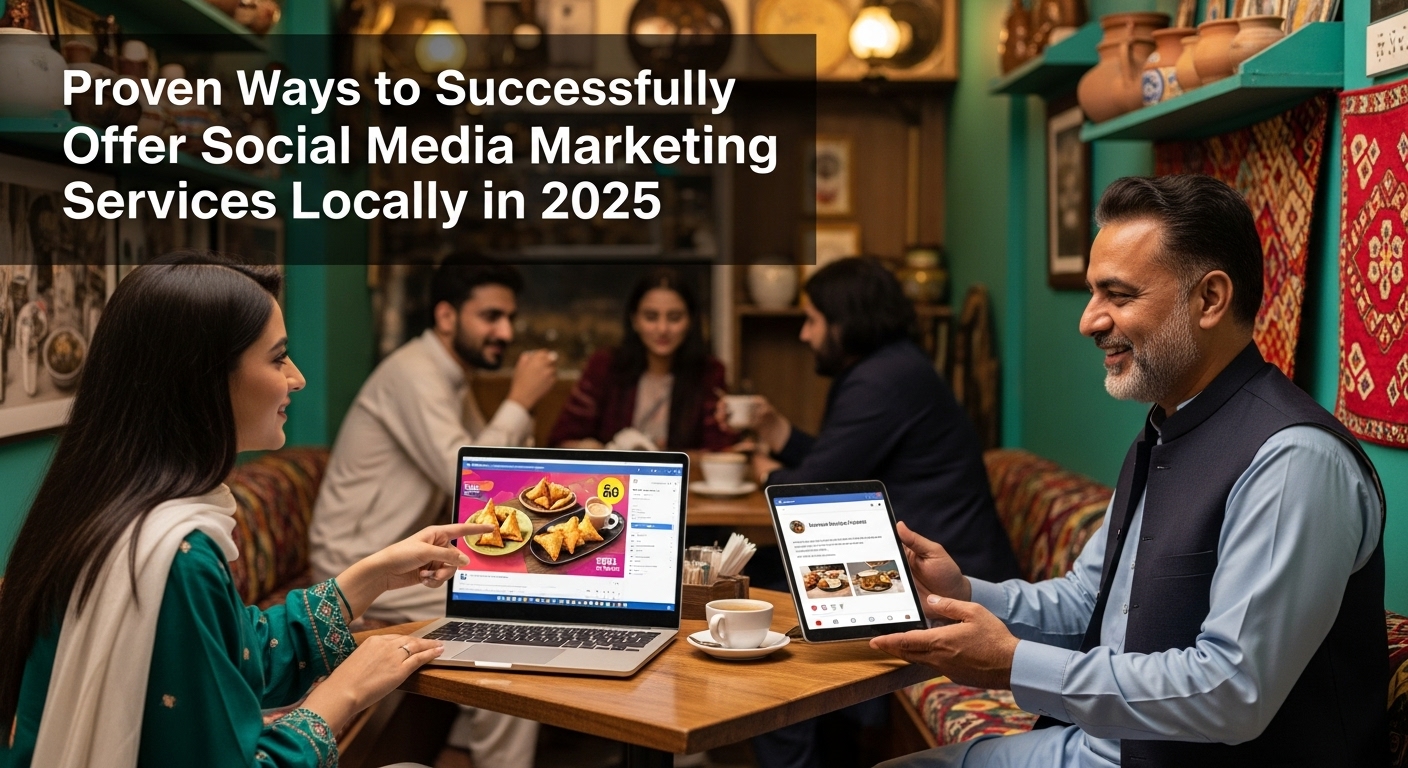Starting a social media marketing business in Pakistan, especially one focused on local clients, is a fantastic opportunity. With the increasing digital footprint of businesses across the country, from small shops in Karachi to budding startups in Lahore and Islamabad, the demand for effective online presence is skyrocketing.
This guide will walk you through every step, helping you build a thriving service that genuinely helps local businesses connect with their customers.
Understanding the Pakistani Social Media Landscape
Before diving in, it’s crucial to grasp how social media operates in Pakistan. It’s not just about posting; it’s about connecting with a diverse audience that spans different languages, cultures, and consumption habits.
What to Understand
The local audience largely uses platforms like Facebook, Instagram, and to a growing extent, TikTok. WhatsApp is also incredibly popular for direct communication and often, even for business transactions.
Step 1: Build Your Foundational Knowledge and Skills
You can’t sell what you don’t understand. Becoming proficient in social media marketing is the very first step.
- Online Courses: There are many free and paid courses available online from platforms like Coursera, Udemy, and even directly from Facebook Blueprint. Focus on courses that cover social media strategy, content marketing, paid advertising, and analytics.
- Hands-on Practice: Start by managing social media for your own business or a friend’s small business, even if it’s pro bono. Experiment with different content types, posting schedules, and ad campaigns. Learn from successes and failures.
- Stay Updated: Social media algorithms and trends change constantly. Follow industry blogs, news sites, and join online communities to keep abreast of the latest developments. This continuous learning is vital for offering cutting-edge social media marketing services in Pakistan.
- Focus on Local Nuances: While international best practices are good, adapt them to the Pakistani context. For example, understand local festivals, slang, and cultural sensitivities.
Step 2: Define Your Niche and Services
You don’t have to be everything to everyone. Specializing can make you stand out.
- Assess Your Skills: What are you best at? Are you a natural storyteller, good with visuals, or excellent with data analysis? Align your services with your strengths.
- Identify Local Demand: Research which local industries or types of businesses are most in need of social media presence. Are there many new cafes opening up? Do local salons struggle with online bookings?
- List Your Services:
- Social Media Strategy Development: Creating a roadmap for a business’s social media presence.
- Content Creation: Designing graphics, writing captions, making short videos.
- Page Management: Regular posting, scheduling, and ensuring consistent brand voice.
- Community Management: Engaging with comments, messages, and building a community.
- Paid Advertising (Ad Management): Running targeted campaigns on Facebook, Instagram, etc.
- Influencer Collaborations: Connecting businesses with relevant local micro or nano-influencers.
- Social Media Audits: Analyzing existing social media presence and providing recommendations.
- Package Your Services: Instead of individual services, offer packages (e.g., “Basic Presence Package,” “Growth Accelerator Package”) that cater to different budgets and needs of local businesses. This makes it easier for clients to understand and choose.
Step 3: Establish Your Business Foundation and Legalities
- Business Registration:
- Sole Proprietorship: This is the simplest form and can be registered with your CNIC. It’s often the starting point for freelancers or individuals.
- Partnership Firm: If you’re teaming up with someone, register with the Registrar of Firms.
- Private Limited Company: For a more formal setup, register with the Securities and Exchange Commission of Pakistan (SECP). This offers liability protection but has more compliance requirements.
- National Tax Number (NTN): Apply for your NTN from the Federal Board of Revenue (FBR). This is essential for tax compliance and invoicing.
- Bank Account: Open a separate bank account for your business. This helps in tracking finances and maintaining professionalism.
- Contracts and Agreements: Draft simple service agreements or contracts. These should clearly outline the scope of work, deliverables, payment terms, and timelines. You can find templates online or consult a legal professional for a tailored agreement.
- Understand Digital Laws (PECA): While not directly aimed at SMM agencies, the Prevention of Electronic Crimes Act (PECA) 2016 has provisions related to online content, data security, and digital fraud. Ensure your practices are compliant, especially regarding data privacy if you handle client data.
Step 4: Create Your Own Online Presence and Portfolio
- Professional Profiles: Set up business pages on Facebook, Instagram, LinkedIn, and perhaps TikTok. Use a consistent brand identity (logo, colors, tone).
- Showcase Your Expertise: Regularly post valuable content related to social media marketing. Share tips, insights, case studies (even if hypothetical initially), and industry news.
- Build a Portfolio:
- Initial Projects: Start with pro bono work for friends, family, or non-profits to build initial case studies. Document results (e.g., increased followers, engagement rates, website traffic).
- Mock-ups: If you don’t have real client work yet, create mock-up campaigns for hypothetical local businesses. Show how you would approach their social media.
- Case Studies: For each project, create a detailed case study explaining the client’s challenge, your strategy, implementation, and the results achieved. Quantifiable results are powerful.
- Get Testimonials: Once you have satisfied clients, ask for written or video testimonials. These are incredibly effective in building trust.
- Website/Online Presence: Consider a simple website or a strong presence on a platform like LinkedIn, which acts as your digital storefront, detailing your services and showcasing your portfolio.
Step 5: Pricing Your Social Media Marketing Services
- Research Competitors: Look at what other social media marketing agencies or freelancers in Pakistan are charging. This gives you a baseline.
- Cost-Plus Pricing: Calculate your operational costs (time, tools, internet, electricity) and add a reasonable profit margin.
- Value-Based Pricing: Focus on the value you provide to the client (e.g., increased sales, brand awareness, lead generation). If your services can significantly boost their revenue, you can justify higher prices.
- Tiered Packages: Offer different packages (e.g., Basic, Standard, Premium) with varying levels of services and corresponding prices. This caters to diverse client needs and budgets.
- Basic Package: Ideal for small businesses wanting a basic online presence (e.g., 8-10 posts/month, basic community engagement). Price could be PKR 25,000 – PKR 40,000 per month.
- Standard Package: More comprehensive, including content creation, ad management (excluding ad spend), and detailed reporting (e.g., 15-20 posts/month, targeted ads for lead generation). Price could be PKR 50,000 – PKR 80,000 per month.
- Premium Package: Full-service, including advanced strategy, influencer marketing, reputation management, and dedicated support (e.g., daily posts, multiple ad campaigns, video content). Price could be PKR 90,000 – PKR 150,000+ per month.
- Consider Add-ons: Offer additional services as add-ons, like video production, professional photography, or advanced analytics reports, for an extra charge.
- Be Flexible (Initially): When starting, you might need to be slightly flexible with pricing to secure initial clients and build your portfolio. However, avoid significantly undercutting your value.
Step 6: Marketing Your Social Media Marketing Services Locally
- Networking:
- Local Business Associations: Join local chambers of commerce or business groups in your city (e.g., Karachi Chamber of Commerce, Lahore Chamber of Commerce & Industry). Attend their events.
- Local Events: Participate in trade shows, expos, or community gatherings where local business owners are present.
- Referrals: Ask satisfied early clients to refer you to other businesses. Word-of-mouth is incredibly powerful in Pakistan.
- Offline Marketing:
- Flyers/Brochures: Create professional flyers or brochures detailing your services and drop them off at local businesses.
- Direct Outreach: Visit local shops, cafes, clinics, and small businesses. Introduce yourself, explain how social media can help them, and leave your contact details. Be polite and respectful of their time.
- Online Marketing (for your own business):
- Targeted Facebook/Instagram Ads: Run ads specifically targeting local business owners in your city or neighborhood.
- Local SEO: Optimize your own website (if you have one) for local searches (e.g., “social media marketing Lahore,” “SMM services Karachi”).
- LinkedIn: Connect with local business owners and decision-makers on LinkedIn. Share valuable insights and engage in relevant discussions.
- Google My Business: Create and optimize your Google My Business profile. This helps local businesses find you when they search for services in your area.
- Partnerships: Collaborate with complementary service providers like web developers, graphic designers, or photographers. You can refer clients to each other.
Step 7: Client Onboarding and Relationship Management
- Initial Consultation:
- Listen Actively: Understand their business, goals, challenges, and current online presence.
- Educate: Explain how social media marketing can specifically help their business.
- Set Expectations: Be clear about what you can and cannot achieve, and in what timeframe.
- Proposal and Contract: Present a detailed proposal outlining the strategy, services, deliverables, timelines, and pricing. Get a signed contract before starting work.
- Onboarding Meeting: Once the contract is signed, have a dedicated meeting to gather all necessary information (brand assets, access to social media accounts, specific preferences).
- Regular Communication:
- WhatsApp Groups: Create a dedicated WhatsApp group for quick communication. This is a very common and effective communication channel in Pakistan.
- Scheduled Meetings/Calls: Have regular (e.g., weekly or bi-weekly) meetings to discuss progress, challenges, and upcoming content.
- Reporting: Provide regular (monthly) performance reports detailing key metrics like reach, engagement, follower growth, and website traffic (if applicable). Explain what the numbers mean and how they contribute to their business goals.
- Feedback Loop: Actively solicit feedback from clients. Be open to constructive criticism and adapt your strategy as needed.
Step 8: Delivering Excellent Social Media Marketing Services
- Content Calendar: Develop a detailed content calendar for each client, outlining topics, post types, and publishing dates. Share it with the client for approval.
- Content Creation:
- Visuals: Use high-quality images and videos. Consider hiring a local photographer or videographer if your budget allows. For local businesses, authentic, locally-shot content performs better than generic stock photos.
- Copywriting: Write engaging captions that reflect the brand’s voice and resonate with the Pakistani audience. Use a mix of Urdu and English if appropriate for the target demographic.
- Localization: Incorporate local events, festivals, cultural references, and humor where relevant and appropriate for the brand.
- Community Engagement:
- Respond Promptly: Reply to comments, messages, and reviews quickly and professionally.
- Foster Interaction: Ask questions, run polls, and encourage user-generated content.
- Address Complaints Gracefully: Handle negative feedback professionally and try to resolve issues offline.
- Paid Ad Management:
- Targeting: Utilize detailed audience targeting features on platforms like Facebook to reach specific demographics, interests, and geographic locations within Pakistan.
- Budget Optimization: Manage ad spend efficiently to maximize results within the client’s budget.
- A/B Testing: Experiment with different ad creatives, copy, and audiences to find what performs best.
- Monitor and Adapt: Continuously monitor performance using platform analytics. Identify what’s working and what’s not, and be prepared to adjust your strategy accordingly. Social media is dynamic.
Step 9: Measuring Success and Reporting
- Define KPIs: Before starting, agree with your client on what metrics define success for them. Common KPIs include:
- Reach & Impressions: How many people saw the content.
- Engagement Rate: Likes, comments, shares per post.
- Follower Growth: Increase in audience size.
- Website Clicks/Traffic: If the goal is to drive traffic to a website.
- Lead Generation/Sales: Number of inquiries or direct sales from social media.
- Use Analytics Tools: Utilize the built-in analytics features of social media platforms (Facebook Insights, Instagram Insights, TikTok Analytics).
- Create Custom Reports: Don’t just dump raw data. Create a visually appealing report that highlights key successes, explains challenges, and outlines future plans.
- Present Findings Clearly: During your monthly meetings, walk the client through the report. Explain what the numbers mean in simple terms and how they tie back to their business goals.
Step 10: Scaling Your Social Media Marketing Business
- Systematize Processes: Document your workflows for content creation, reporting, and client management. This makes it easier to onboard new team members or manage more clients efficiently.
- Hire Smart: If you plan to expand, look for individuals with complementary skills. Perhaps a talented graphic designer, a sharp copywriter, or an ad specialist. Start with freelancers or part-timers if full-time hires are too much initially.
- Specialized Tools: Invest in tools that can automate tasks like scheduling posts, managing multiple accounts, or advanced analytics.
- Diversify Services: Once you’ve mastered social media marketing, consider offering related services like SEO, email marketing, or website design, as many local businesses might need a complete digital solution.
- Mentorship: Seek advice from experienced entrepreneurs or digital marketing professionals in Pakistan. Their insights can be invaluable.
Conclusion
Offering social media marketing services locally in Pakistan is a rewarding venture. It allows you to directly contribute to the growth of local businesses, strengthening the economy and fostering community connections. By building a strong foundation of skills, defining your niche, establishing a professional business, and consistently delivering value, you can create a highly successful and impactful service. Remember, the key is to stay updated, be adaptable, and always focus on providing tangible results for your clients in the dynamic Pakistani digital landscape.
Resources
Training & Certification Platforms
- Facebook Blueprint – For official training and certifications on Facebook and Instagram marketing.
- Google Skillshop – For various digital marketing courses, including Google My Business.
Business Registration & Compliance (Pakistan)
- SECP (Securities and Exchange Commission of Pakistan) – For company registration.
- FBR (Federal Board of Revenue) – For National Tax Number (NTN) registration.
Networking & Business Support
- Local Chambers of Commerce & Industry – For networking opportunities and local business development support.
Online Freelance Platforms
These platforms, though global, offer insights into local rates, client expectations, and may even lead to local project opportunities.










